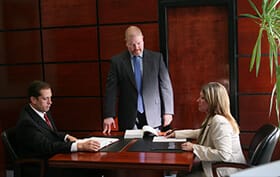Failure To Yield Accidents
Many motor vehicle accidents are caused by the failure to yield the right of way. Oftentimes the failure to yield results in motor vehicle side impact collisions, car-pedestrian accidents, car-motorcycle and car-bicycle accidents.
The term right of way refers to preference between two motor vehicles, a motor vehicle and pedestrian, or motor vehicle and bicyclist of which has the right to passage as they meet at the same place and time. Note that the individual or vehicle who has the right of way does not have an absolute right; in other words, the possessor of the right of way is not relieved from his duty to use reasonable care for his own safety and the safety of others. The general rule being, if a driver fails to comply with the right of way laws, then that driver is at fault.
If you have been injured by a driver who failed to yield the right of way, contact . We are Massachusetts injury attorneys with more than 50 years’ experience helping those injured in car accidents.
Types Of Right Of Way Cases
The following are situations in which drivers are required to yield the right of way:
- Stop signs — When one stop sign is involved, the car with the stop sign must come to a complete stop and wait for safe entry into the roadway where those vehicles have the right of way. If the driver disregards the stop sign or enters the lane of travel without care, he or she has done so without yielding the right of way.
- T-intersections — Some of the T-intersections have stop signs and some do not. Regardless, vehicles on the continuing street have the right of way and the vehicles on the terminating street must yield.
- Three-way or four-way stop sign — When two or more cars are stopped at a three or four-way stop sign, the car that arrived at the stop sign first has the right of way. If two cars arrived at the same time, the car on the right has the right of way.
- Left turns — Vehicles that are making left turns must always yield the right of way to oncoming traffic. In Massachusetts, when a driver is making a left turn, crossing the path of the right of way traffic, and an accident results, there is a presumption that the car making the left turn is at fault. This presumption is extremely difficult to overcome.
- Driveways — Cars exiting from driveways must yield the right of way to any traffic, i.e., cars, pedestrians or bicycles that are already traveling on the street or sidewalk. The driver exiting from a driveway must use reasonable care by stopping first before he reaches the sidewalk or roadway to check for oncoming traffic and pedestrians.
- Crosswalks — Drivers should always pay attention to crosswalks and yield the right of way to pedestrians, even if the “Don’t Walk” sign is flashing. Drivers making a right turn on red or making a right turn on a green light should be particularly aware of pedestrians in the crosswalk before turning.
- Right turn on red — A driver making a right turn on a red light must yield the right of way to oncoming vehicle traffic and pedestrians in the crosswalk. A vehicle should always stop prior to the crosswalk and wait until there are no oncoming vehicles or pedestrians and then proceed to complete the turn.
Contact Massachusetts Auto Accident Attorneys At
If you were injured by a driver who did not yield the right of way, you should seek the representation of an experienced personal injury attorney. For a free initial consultation, contact our Massachusetts law firm by telephone or by using our online contact form. For your convenience, home and hospital visits are available upon request.




